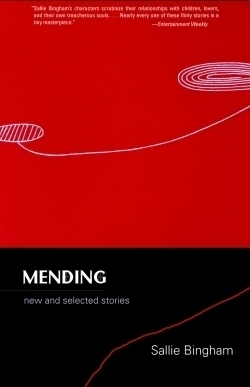Mending
Avoiding cynicism and turning feverishly to the bright side requires an adjustment in attitude, but also a willingness to look at life with a selective eye. This shedding away of all that goes wrong in the everyday to make way for the pure and good—seemingly the brighter and better—is a disservice to the truths of ordinary life and all they have to offer. It is after all, the dark that gives life depth.
In Mending, the smudges in the everyday are brought to light organically; they are not celebrated, nor are they shunned. They are observed and offered up to the reader as an avenue to understanding, as quiet revelation. Comprised of eighteen short stories divided into five sections that span the fifty-year career of author Sallie Bingham, this is a comprehensive collection that features a variety of characters and subject matter, but is bound together by an insistent, purposeful, and tender investigation of why and how we go on.
At its heart, this is a book about relationships. From the intense scrutinizing gaze between negotiating young lovers in “Winter Term,” to the trickling panic of unexpected emptiness for a new father in “The Ice Party,” the brief, fleeting transactions between two strangers in “Seagull,” or the prickling sting of subdued sibling rivalries in “Selling the Farm,” Bingham writes about the desolation of the ordinary, the minute factors that bring people together and then slowly tear them apart.
Bingham is starkly, keenly observant. Astutely, she resists melodrama and treats her subject matter with a sort of dry kindness, and a stoic attention placed on details that reveal the architectures of the characters’ worlds. These details are precise, selected with a discerning eye, and delivered through clean, unaffected prose. In “Found,” the young protagonist observes the cook through a doorway: “The girl remembered seeing the cook, a column standing over her stove. It did not seem likely written words could reach her.” The observation shapes both the beholder and the object of observation, the reader learning at once the cautious lens through which the protagonist views the world, and by extension the kind of world that shapes her tentative mind.
“Found” takes place in Paris and its tone is reminiscent of Mavis Gallant’s detached tone, the prose underscored with a subdued earnestness. It also echoes Gallant thematically, following the story of a female protagonist struggling as an expatriate in a European country. Bingham’s story of a young girl in Paris centers on themes echoed in subtle ways throughout the rest of the collection: An observant, keenly self-aware protagonist barricaded by a world she does not understand, her yearning for even the subtlest form of power and control expressed through small triumphs.
Bingham’s prose has a refreshingly sardonic edge that is darkly revealing. She never overwrites; her lines are clean and exact, those heavy, worldly themes expressed through prose that does not overburden the reader. Important things are said quietly, simply. In the story “Heaven,” the almost frantic struggle of a woman to reconcile her unexpected belief in heaven with her own perceptions of the afterlife as unfathomable is explained plainly: “It was the fresh air of faithlessness, where any idea could drift and blow.” The familiar feeling is made new again, the language light and easy.
This restrained tone combined with clean, cutting lines of prose evoke a major theme of the collection: the disconcerting realization of human limitations. In “Ice Party,” a new father sits alone in his car and ponders the apathy he feels towards his baby son and the unsettling feelings he has towards his wife (who, once luminous, is now bedridden and nursing): “He felt cold and lost and a little ashamed, like a child who knows his misery is laughable to everybody else in the world.” These moments of realization, universal and damning, press at the pulse of human frailty: our failure to live up to our own standards, to be as much as we imagined. This failure to thrive is placed under the spotlight and scrutinized. In “Winter Term,” an increasingly reticent boyfriend wrestles with the suffocating responsibility he feels for the emotional well-being of a sensitive, cloying girlfriend: “When Ellie was hurt the consciousness of it ticked like a clock at the back of his mind and he could not concentrate on anything.”
Bingham has created an unflinchingly honest collection of stories that turns away from the gloriously bright and saccharine allure of unsullied optimism and offers readers something evocative and true. In this way, Mending is not about the monotony of human failure, it is about the ways we yearn for absolution and occasionally find within our struggles an unregulated rhythm of small triumphs.
Reviewed by
Shoilee Khan
Disclosure: This article is not an endorsement, but a review. The publisher of this book provided free copies of the book to have their book reviewed by a professional reviewer. No fee was paid by the publisher for this review. Foreword Reviews only recommends books that we love. Foreword Magazine, Inc. is disclosing this in accordance with the Federal Trade Commission’s 16 CFR, Part 255.

